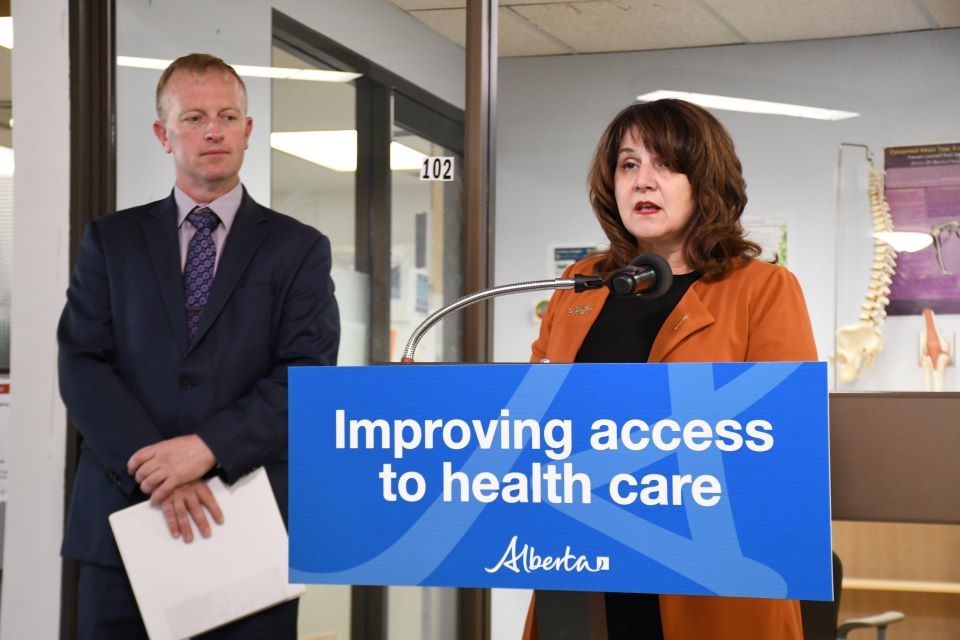Health-care understaffing, limited access to services and reduced emergency department hours — they’re features of rural life that Albertans should not be forced to endure, the health minister acknowledged Oct. 7.
But Adriana LaGrange said her government is on the case through health-care delivery restructuring and a strategic document called Rural Health Care Action Plan 2024-2027. The plan is dedicated to locally tailored solutions to problems in rural and remote areas of Alberta, LaGrange told The Macleod Gazette and other rural media.
The plan will guide the government’s efforts to close the gap between services rural Albertans receive and those provided in urban centres and their surrounding communities, said LaGrange, the member for Red Deer-North.
“It should not matter where you live,” LaGrange said. “All Albertans should have access to the health-care services that they require and deserve. That’s why Alberta's government is exploring innovative solutions to provide rural and remote communities the best care possible, when and where people need it the most.”
Sarah Hoffman, the NDP’s health critic, has no issues with the plan itself. It’s the UCP’s record on health care that should make Albertans wary, she said.
“The words on the paper are good words and make good sense, but I don't think we can trust (Premier) Danielle Smith and Adriana LaGrange to deliver on them,” Hoffman told The Gazette.
Last year emergency departments were closed for more than 38,000 hours in Alberta, published reports say. Most of that happened in rural Alberta, Hoffman said. Also, the province has been disingenuous in its negotiations with doctors over the rates they can charge, resulting in some choosing to leave the province.
And the division of Alberta Health into four pillars is a misdirection of public health-care dollars, she added.
Smith and LaGrange “have been undermining public health care and rural health care since they both have been in these jobs,” said Hoffman, the member for Edmonton-Glenora. “They’ve been working on (health-care reform) for a year, and I don't think they've been moving the pendulum in the right direction.”
LaGrange highlighted three programs she says demonstrate that UCP’s commitment to solutions.
Bursary spending worth $16-million will go to qualified medical students in return for three-year commitments to practice in rural or remote communities. Doctors who start their careers beyond the bright lights tend to learn what smaller communities have to offer and then stay, LaGrange said.
New grant programs in rural and remote communities will put $800,000 towards first-responder services and $600,000 towards first-responder education.
“We are bringing together the crucial components needed to improve health care for all Albertans and provide opportunities for future physicians and other critical health-care workers to live and work closer to home,” said LaGrange.
The rural plan focuses on the health-care workforce, patient access, unique models of care and solutions, community care, and prevention and wellness. Outcomes it envisions are:
• equitable access
• a rural health-care approach that’s durable, sustainable, modern, cost-effective and nimble — “able to evolve and adapt”
• engaged communities contributing to decision-making to help address their unique needs
• a focus that supports health promotion and prevention, providing conditions “towards healthy living in local settings.”
About 18 per cent of the province’s population — nearly 900,000 people — live in remote or rural communities, or large rural centres and their surrounding areas, the health-care plan says. For people born in 2023, life expectancies are lower than elsewhere in Alberta.
Generally, the closer you live to an urban centre, the longer your life expectancy. The 2023 number is 75.1 years for remote areas, 78.1 for rural areas, and 78.2 for large rural centres and their surrounding areas.
In communities with “a moderate urban influence,” life expectancy is 79.6 years. Metro-influenced areas are the sweet spots for life expectancy, at 81.9.
The numbers drop slightly for metro areas to 81.5 years and for urban areas to 79.6, but they’re still higher than those of rural and remote areas.
LaGrange told the roundtable that the plan was “greatly influenced” by consultations with Albertans about their health-care needs.
The province held more than 65 in-person consultations, most of them in rural or remote areas. Another 35 consultations were geared for Indigenous Albertans. About 10,000 people attended telephone town halls and 18,000 replied to surveys.
“The one thing that was very clear was that there are some significant challenges in our rural, remote locations. The strategies that have been used to date, while somewhat effective, haven't been as effective as they could or should be,” said LaGrange.
“So we have to also think of new things to do. And that is why we're looking at an actual strategy that addresses all the areas, not just piecemealed. This is more holistically strategic than what I've seen happening in the past.”
But Hoffman said she’s not optimistic that the UCP will follow through. “I hope I'm wrong, that we do see meaningful improvement. But over the last five and a half years, we've seen things move in the wrong direction,” the shadow minister said.
“So they're saying, trust us. It's hard to have trust when they've proven time and time again that they don't actually respect doctors and that they aren't standing up for folks to have the care that they need in rural Alberta.
“But that's what we will continue to push them to do,” Hoffman said.



